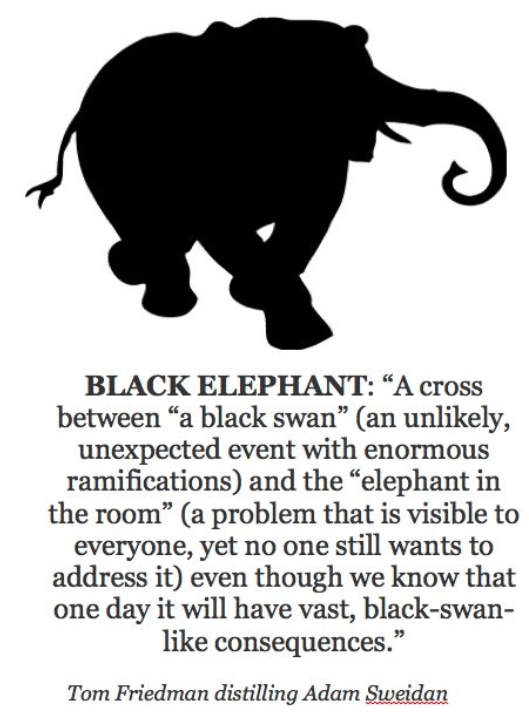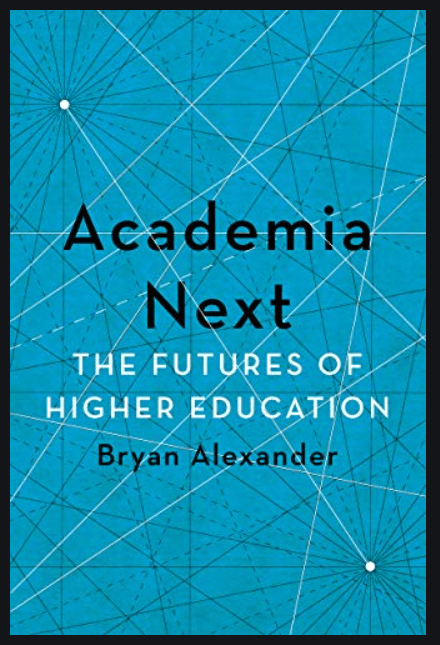Harold Jarche hosts a global “coffee club” which meets via Zoom monthly. With membership worldwide, it is always “coffee time” somewhere, and our monthly meetings not only touch on leadership and the gig economy, but provide a more nuanced view of the world than one that is USA-centric.
This week, the club had members from New Zealand, USA, Chile, Canada, Canary Islands, France, the Netherlands, and India. Amazing to hear perspectives about the pandemic from each of these areas! Srikanth had a great new term that I plan to adopt:
“I have decided that I am a dystopian optimist!”
Andrew Trickett discussed his exploration of “Black elephants.” For those of you (like me) who were unfamiliar with the term, a black elephant is a cross between a black swan and the proverbial elephant in the room that goes ignored. The black elephant is a significant threat, risk or issue that is obvious to everyone (or the experts who give warnings), but no one wants to address or deal with it. When it becomes a full-blown problem with a high impact, people are surprised and act as if it were an unpredictable black swan event.
Tom Friedman wrote about stampeding black elephants in 2014 and last March, Martin Padulla categorized COVID-19 as a black elephant. Friedman followed suit in April. In September, Burchman and Jones in the HBR wrote that boards need new strategies to address this black elephant.
A problem that is visible and yet no one wants to address it …
It is interesting to consider this as I finish reading Bryan Alexander’s new book (2020) Academia Next: The Futures of Higher Education.
I have enjoyed Bryan’s blog posts and tweets over the years. His book was written before we knew about COVID-19, and yet one of the scenarios noted was a global pandemic! This book recently received a Most Significant Futures Works award from The Association of Professional Futurists (APF).
The award is justified, as Bryan has never shied away from addressing black elephants. He explores future trends such as the financial crises facing higher education, equity issues, adjunctification, and the impact of technology. He forecasts megatrends such as the decline of liberal education, the collapse and merger of institutions, and what he termed the “Queen Sacrifice” – a chess term (timely with Netflix’s excellent show Queen’s Gambit) for the sacrificing of the most critical chess piece – the queen – in order to achieve a win. In this case, what Bryan sees being sacrificed are tenure-track positions.
Bryan laid out a series of possible future scenarios based on these black elephants.
- Peak Higher Ed (higher ed in decline)
- Health Care Nation (higher ed as a support mechanism for health care)
- Open Ed / Open Access
- Renaissance (great steps forward with great tragedies)
- Augmented Campus
- Digital Tutors
- Retro Campus
With hindsight, it is now fascinating to overlay the global pandemic on these scenarios. Dian Schaffhauser in Campus Technology last month wrote about envisioning the future of higher education in a post-pandemic world. Her post in many ways mirrored Bryan’s book, thinking systematically about possible futures, looking to lower costs and increase access to programs that help people reskill, and equipping students with the ability to answer moments driven by change.
With the promising news this week of potential vaccines to address COVID-19, it would be easy to suppose that life will soon get back to normal. Yet, as Sir Winston Churchill was credited with saying, “Never let a good crisis go to waste.” Not to belittle the impact that the pandemic has caused, it is also an opportunity to explore the scenarios Bryan laid out and envision a new normal for the future of higher education. Last week, in a post by Avoa CIO Strategic Advisors, they noted:
“…There was a new normal coming. What it was, however, was not clear… Some hoped that the threat would pass, and they could resume operations post-pandemic. Unfortunately, this was a very dangerous decision as it left companies flat-footed in their response to change… other IT leaders recognized that the pandemic provided a unique opportunity to accelerate innovation efforts. For some, that mean accelerating their digital transformation efforts in support of their business transformation. For others, it meant moving spend toward more innovative efforts that put the company on stronger footing.”
That call to CIO’s can also apply to those of us in higher education. Just as this post implied, there is a danger in assuming that higher education will return to it’s peak of last decade. We need campus dialogues across this country (world?) to create a vision for our future, and a roadmap to move us there.
As such, Bryan’s Academia Next is a good place to start the conversation!
{Graphics: Jarche, Revkin, John Hopkins Press}


